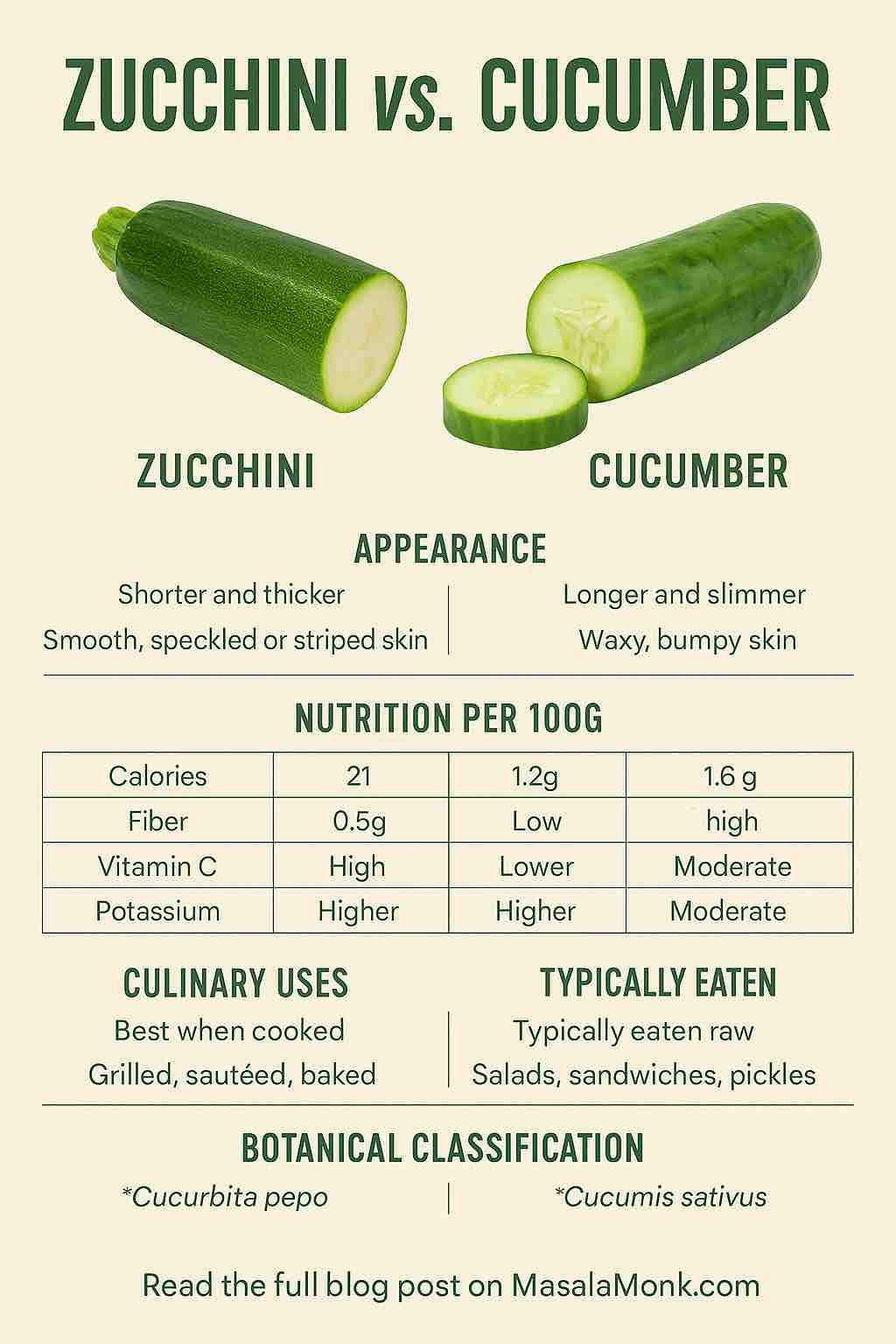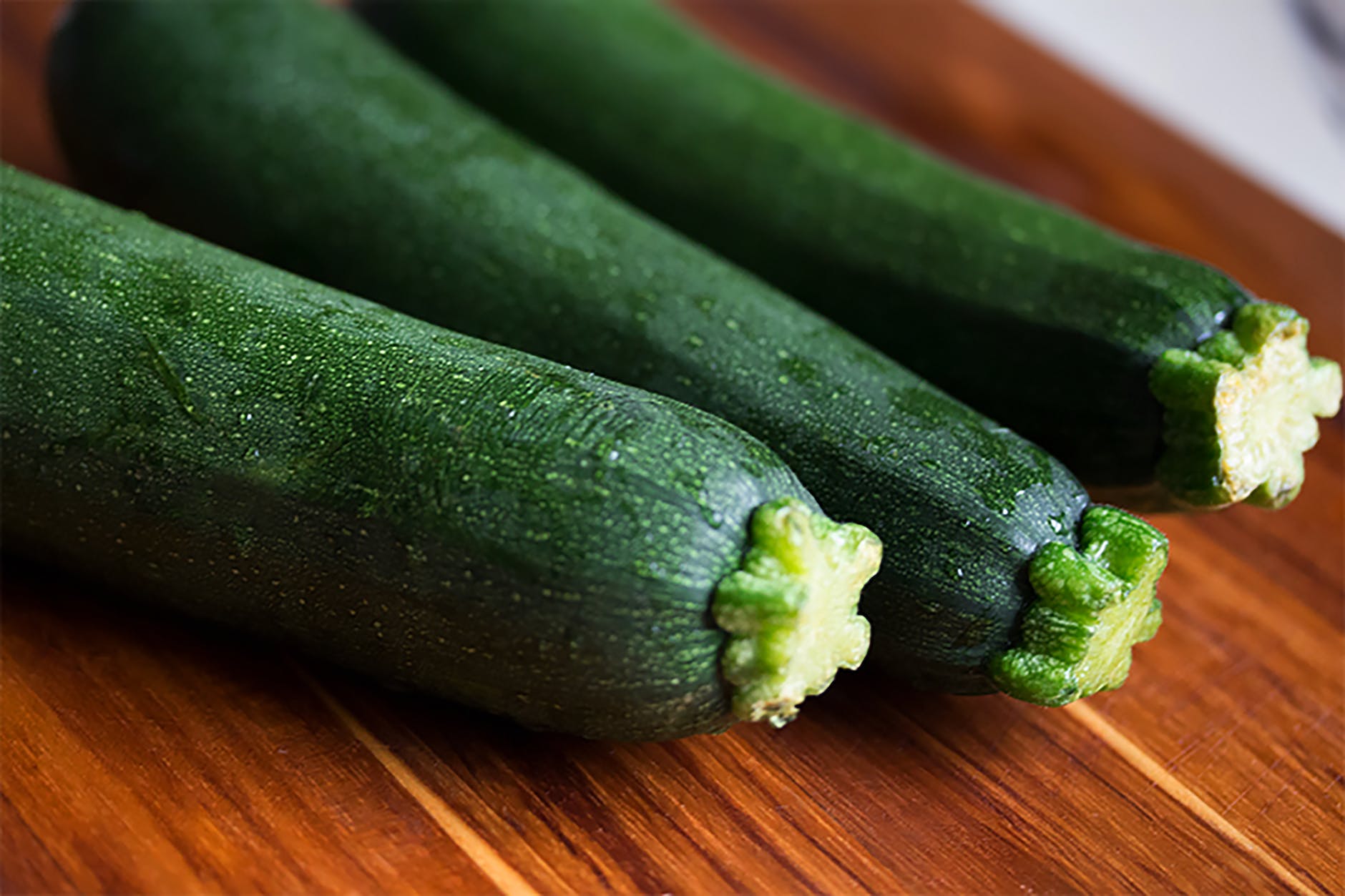
At first glance, zucchinis and cucumbers may seem like twins separated at birth—long, green, and often occupying neighboring bins at the grocery store. But are they really the same? Can they be used interchangeably in recipes? And what about their nutrition—who wins the health crown?
If you’ve ever wondered “Is zucchini a cucumber?” or searched for “difference between zucchini and cucumber,” you’re not alone. Thousands of people every month look up variations of this question. This comprehensive guide will walk you through every major difference—from appearance and taste to nutritional value and culinary use. Let’s settle the zucchini vs. cucumber debate once and for all.
🧬 Are Zucchini and Cucumber the Same?
Short answer: No, they’re not the same.
While both belong to the Cucurbitaceae family (commonly known as the gourd family), cucumbers and zucchinis are different species, with unique textures, flavors, and culinary applications.
- Cucumber (Cucumis sativus) is a fruit (yes, botanically!) often eaten raw.
- Zucchini (Cucurbita pepo) is also a fruit, but one that’s commonly cooked and referred to as a vegetable.
🌿 Visual & Botanical Differences
| Feature | Cucumber | Zucchini |
|---|---|---|
| Species | Cucumis sativus | Cucurbita pepo |
| Origin | South Asia | Italy (as a summer squash) |
| Growth Habit | Climbs on vines | Grows in bushy plants |
| Skin Texture | Smooth to bumpy, waxy | Smooth, sometimes speckled |
| Color | Uniform deep green or striped | Dark green, light green, or yellow |
| Seeds | More visible, larger | Finer, softer, less noticeable |
While they both look similar at a glance, cucumbers tend to be longer and thinner with a glossy, sometimes waxy coating. Zucchinis, on the other hand, are more matte and have a slightly thicker, firmer appearance.
🧊 Texture, Taste & When to Use Each
🥒 Cucumber: Crisp, Cool, and Refreshing
- Taste: Mild, watery, slightly sweet
- Texture: Crunchy and refreshing
- Best Used For: Raw dishes like salads, sandwiches, and pickles
- Common Types: English (seedless), Persian (mini), Slicing (common grocery-store type)
🥗 Zucchini: Mild, Tender, and Versatile
- Taste: Mild, earthy, slightly sweet when cooked
- Texture: Softens when cooked, slightly spongy raw
- Best Used For: Grilling, sautéing, roasting, baking, spiralizing
- Common Types: Green zucchini, golden zucchini, costata romanesco
Pro Tip: Never use cucumber in a stir-fry—its high water content and delicate texture make it unsuitable for heat. Zucchini, however, thrives in the pan or oven.
🍽️ Zucchini vs. Cucumber in the Kitchen
| Use Case | Cucumber | Zucchini |
|---|---|---|
| Raw Salads | ✔️ Crisp and refreshing | ⚠️ Slightly chewy raw |
| Grilled Dishes | ❌ Too watery | ✔️ Excellent when grilled |
| Pickling | ✔️ Classic use | ⚠️ Not commonly pickled |
| Baking (e.g., bread) | ❌ Doesn’t bake well | ✔️ Moist and perfect for baking |
| Spiralized “noodles” | ❌ Breaks easily | ✔️ Ideal zoodle material |
🥗 Nutritional Comparison: Zucchini vs. Cucumber
Both are low-calorie, hydrating options, but zucchinis have a slight edge in terms of nutrient density.
| Nutrient (per 100g) | Cucumber | Zucchini |
|---|---|---|
| Calories | 15 kcal | 21 kcal |
| Water Content | 95% | 92% |
| Fiber | 0.5 g | 1.2 g |
| Vitamin C | Low | Higher |
| Vitamin K | High | Lower |
| Potassium | 147 mg | 261 mg |
| Carbs | 3.6 g | 3.9 g |
| Protein | 0.65 g | 1 g |
- Zucchini: Higher in potassium, fiber, and vitamins like C and B6. Better choice if you’re aiming for more nutrients.
- Cucumber: Great for hydration and weight loss diets due to ultra-high water content.
❄️ Storage & Shelf Life
- Cucumbers: Best stored wrapped in plastic or in a produce bag in the crisper drawer. Avoid high humidity to prevent soft spots.
- Zucchinis: Store unwashed in a paper bag in the refrigerator’s crisper drawer. Avoid airtight containers—they trap moisture and lead to rot.
🇬🇧 Courgette vs. Zucchini: Are They Different?
Nope! They’re exactly the same. “Courgette” is simply the British English term for what Americans call “zucchini.”
So if you see “courgette vs cucumber” or “difference between courgette and cucumber,” you’re really just revisiting the zucchini vs. cucumber discussion with UK spelling.
🔄 Can You Substitute One for the Other?
In some raw dishes—like salads—you can swap cucumber and zucchini, especially if the zucchini is very young and tender. But for most recipes, they serve different purposes.
- ✅ Acceptable Swaps:
- Raw spiralized zucchini in a cucumber salad
- Raw zucchini slices in sandwiches
- ❌ Bad Swaps:
- Grilled cucumber (becomes mushy)
- Pickled zucchini (not a classic flavor or texture)
- Baked cucumber bread (won’t work!)
🧾 Final Thoughts: Which One Should You Use?
Choose cucumber if you’re making:
- Crisp, cold dishes
- Summer salads or sandwiches
- Pickles or infused water
Choose zucchini if you’re making:
- Stir-fries or roasted vegetables
- Low-carb pasta alternatives
- Savory baked goods like muffins or bread
📌 Bottom Line
Zucchini and cucumber might be cousins in the plant kingdom, but they live in totally different culinary worlds. Knowing which to use—and when—will not only elevate your recipes but also prevent soggy stir-fries or dry sandwiches.
Next time you’re at the grocery store and caught in the zucchini vs. cucumber conundrum, remember: one’s made for the skillet, the other for the salad bowl.
FAQs: Zucchini vs. Cucumber
1. Are zucchini and cucumber the same?
No. While they may look similar, zucchini and cucumber are different species with distinct textures, flavors, and culinary uses. Zucchini is typically cooked, while cucumber is eaten raw.
2. Can I substitute cucumber with zucchini in recipes?
Only in some cases. You can use raw zucchini in salads or sandwiches in place of cucumber, but cucumber doesn’t hold up well to cooking, so it can’t replace zucchini in hot dishes.
3. What is the nutritional difference between zucchini and cucumber?
Zucchini is higher in fiber, potassium, and vitamin C, making it more nutrient-dense. Cucumber has a higher water content and fewer calories, ideal for hydration and weight loss.
4. Which is better for weight loss: zucchini or cucumber?
Both are excellent low-calorie options. However, cucumber has slightly fewer calories and more water, making it especially effective for hydration and appetite control.
5. Is it safe to eat raw zucchini like cucumber?
Yes, raw zucchini is safe to eat and often used in salads or as spiralized “zoodles.” Just note that its texture is firmer and flavor more neutral than cucumber.
6. Why do cucumbers taste different from zucchinis?
Cucumbers are crisp and watery with a subtle sweetness. Zucchinis are denser and more neutral or earthy in taste, especially when cooked.
7. Is courgette the same as zucchini or cucumber?
“Courgette” is simply the British English term for zucchini. It is not another name for cucumber.
8. Can you pickle zucchini like cucumber?
Technically yes, but the texture and flavor are not the same. Zucchini doesn’t have the same crunch or acidity balance that cucumbers offer when pickled.
9. How can you tell zucchini and cucumber apart visually?
Cucumbers usually have a waxy, bumpy skin and a cooler touch due to high water content. Zucchinis have smoother, sometimes speckled skin and are more matte in appearance.
10. Which plant grows better in home gardens—zucchini or cucumber?
Both grow well, but cucumbers need support (they vine), while zucchini grows as a bush. Zucchini is often easier for beginners due to fewer pest issues and simpler harvesting.










